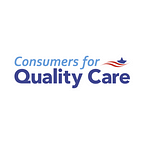Looking Beyond COVID-19: Three Reforms for More Affordable, Equitable Health Care
By Donna Christensen, Consumers for Quality Care Board Member
With more than half of Americans having received at least one dose of a COVID-19 vaccine, sighs of relief are beginning to be heard across the country. While we collectively celebrate the impending “return to normal,” Americans are still experiencing unsustainably high health care costs — a problem that has come to the forefront as COVID patients experiencing long-lasting symptoms are facing mounting medical debt that has led to bankruptcy in some cases. As insurers begin rolling back fee waivers for COVID-19 testing and treatment despite remaining profitable throughout the pandemic, policymakers must not lose sight of addressing the long-standing barriers Americans continue to face when it comes to accessing affordable, equitable and quality health care.
The American Rescue Plan is a strong first step in reducing health insurance costs for some Americans. However, the 158 million Americans with employer-sponsored insurance — nearly 24 million of whom pay more than 10 percent of their household income in premiums and another 10 percent in out-of-pocket expenses — are still waiting for relief.
According to new research from ALG Research and Public Opinion Strategies, 81 percent of Americans agree the coronavirus crisis has shown the flaws in our current health care system. But these problems are not new, nor will they disappear once the pandemic is over. While there is a myriad of problems in our health care system, the ALG/POS research identified three vital issues that Americans want policymakers to tackle with common sense, bipartisan reforms that will benefit millions.
High Deductibles
Eighty percent of voters agree that their family’s health care costs are continuing to climb annually. High deductibles are a significant factor in increasing health care costs, with more than half of Americans enrolled in a high-deductible health care plan in 2019 — an increase of 43 percent from 2014. As a result of the pandemic, nearly 8 million American workers lost their employer-sponsored health insurance by June. Many of these Americans who were able to afford private insurance had to enroll in plans with high deductibles, increasing their out-of-pocket costs. This is particularly problematic given that 51 percent of Americans are worried they won’t be able to afford a high deductible within the next five years, and voters almost unanimously agree (92%) on the importance of ensuring deductibles are low enough to not get in the way of accessing care.
Inequities in health care are long-standing and wide-reaching, and the impact of high deductible plans is no outlier. Research has shown that Black Americans in these plans avoid treatment more than their white counterparts, widening the racial health gap. And 1-in-3 voters of color are extremely concerned about being unable to afford a high deductible for the care they need.
Junk Plans
A majority of Americans (84%) believe that insurance companies should not be allowed to sell plans that cover so little that going to the doctor isn’t affordable, even with insurance. Unfortunately, short-term, limited duration insurance plans (STLDIs) that don’t have to adhere to Affordable Care Act guidelines and can reject people with pre-existing conditions and exclude coverage for specific diseases and services have proliferated since a 2018 Trump administration rule allowing their expansion. Since these plans are not subject to cost-sharing limits, they are particularly problematic given 73 percent of Americans struggle with budgeting for annual health care costs due to their unpredictability.
These skimpy plans often have lower premiums, which may make them more attractive to low-income Americans and people of color. Fifty-three percent of voters of color were very or extremely concerned that they won’t be able to afford their monthly premiums in the next five years, compared to 43 percent of their white counterparts. Research also shows that STLDIs regularly engage in discriminatory practices against women, often denying coverage for maternity care and preventative screening procedures, as well as charging women more than men for the same services.
Pre-Existing Conditions
Americans overwhelmingly agree (89 percent) that it is vital to guarantee insurance coverage for people with pre-existing conditions. As the lingering effects of COVID-19 continue to come to light, 68 percent of Americans are worried that insurance companies will try to deny people coverage who have had COVID-19 or raise their premiums. This is of particular concern for people of color, who have disproportionately borne the brunt of the pandemic. In fact, 80 percent of people of color already believe that insurers are charging so much for care if you have a pre-existing condition, they are basically denying people coverage.
Addressing these issues with common-sense reform should be a bipartisan priority. They don’t require a complete overhaul of the system, something that 79 percent of voters don’t actually want, especially while the health care system is still stressed due to the pandemic. What Americans do want, and what policymakers have a duty to deliver, is common-sense health insurance reform that will address these issues and ensure quality, affordable and equitable health care coverage and services.
The Honorable Donna M. Christensen is a member of the Consumers for Quality Care board. She retired in 2015 from the U.S. House of Representatives, where she served nine terms. She is the first female physician to serve as a member of the history of the U.S. Congress.
